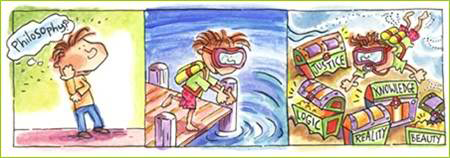Philosophy is taught to all students at Buranda State School. The teaching of philosophy directly addresses many of the general capabilities in the Australian national curriculum.
Philosophy in schools grew out of Philosophy for children, which was first developed by Professor Matthew Lipman in the United States during the 1970s. While teaching philosophy at Columbia University in New York, Professor Lipman realised that many of the undergraduates he was trying to teach had not been taught how to think effectively. He decided to attack the problem at its root cause, by beginning with children.
Philosophy in schools involves developing a ‘community of inquiry’ that is based on the values of care and respect for all its members, and which consequently generates its own rules for operation.
Philosophical inquiry:
Enables children to participate in facilitated philosophical discussions about the big questions of life.
-
Provides children with the skills to share ideas, thoughts and beliefs.
-
Assists in the development of thinking and social skills.

Encourages children to develop hypotheses, give examples and reasons, build on each other’s ideas, justify decisions and recognise inconsistencies in arguments.
-
Values the ability to change one’s mind in response to a justified reason.
-
Helps children to think deeply, make reasoned judgments and deal appropriately with conflict.
-
Allows children to apply their knowledge more effectively.
The basic procedure for philosophical inquiry is generally as follows:
-
Read story (carefully chosen by teacher!).
-
Students raise questions about the story.
-
Students connect questions and identify themes.
-
Discussion.
-
Reflection.
After or during this time teachers may utilise concept development activities to enable students greater understanding of concepts being explored. Children are also provided opportunities to reflect upon these sessions (orally and written).
Examples of philosophical questions discussed:
What does it mean to be fair?
How can I come to know anything?
How do we know that something is real?
Why can something be considered ugly?
How do we recognise faulty reasoning?
